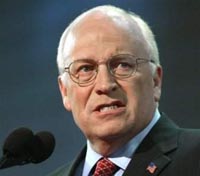Dick Cheney arrives in Tokyo to talk to Japanese emperor
U.S. Vice President Dick Cheney arrived in Tokyo on Tuesday for a meeting with the emperor, dinner with the prime minister and a pep rally for U.S. troops aboard the aircraft carrier Kitty Hawk.

However, he will not be meeting Japan's outspoken defense minister, who recently set off a tempest by calling the U.S.-led invasion of Iraq "a mistake."
Cheney's brief visit - he was to depart early Thursday - is a gesture of appreciation for Japan, which has been one of Washington's most valuable allies in its global war on terror, sending troops to Iraq and deploying logistical help for U.S. and coalition forces in Afghanistan.
After a dinner with the U.S. ambassador Tuesday night, Cheney was to meet Emperor Akihito and Empress Michiko, dine with Prime Minister Shinzo Abe and talk with Foreign Minister Taro Aso. He also was to give a speech to U.S. troops aboard the Kitty Hawk before flying on to Australia and the tiny U.S. island of Guam.
The visit has caused something of a stir because Cheney is not meeting with Defense Minister Fumio Kyuma, who recently said the U.S. decision to invade Iraq was based on dubious assumptions that Saddam Hussein possessed weapons of mass destruction and was thus "a mistake."
The comment generated a flurry of retractions and clarifications from Japan's government, which has been a staunch supporter of Washington's war in Iraq and sent hundreds of non-combat troops to the country to provide humanitarian assistance, such as rebuilding roads and schools and supplying fresh water to an area in Iraq's south.
Kyuma later claimed his remark was misinterpreted, though he said Washington should have been more cautious, the AP reports.
Officials said Cheney was not meeting Kyuma because he did not have time. The Foreign Ministry has also noted that it is not unusual for the two not to meet - Cheney didn't see the previous defense chief when he visited here three years ago.
Security is a major issue.
Japan and the United States are seeking to maintain a closely coordinated stance on North Korea, which recently agreed in multilateral talks to allow inspections and shut down a nuclear reactor in exchange for energy aid and other incentives. The talks - involving Japan, the U.S., Russia, China and the two Koreas - are aimed at getting the North to abandon its nuclear weapons program altogether.
Japan will also be pitching its plea for pressure on North Korea to provide more information on the fate of more than a dozen Japanese who were abducted in the 1970s and '80s. Japan believes some may still be alive, and that more may have been kidnapped by the North than the 12 or so it has admitted taking.
Cheney and Japanese leaders are also expected to discuss a wide-ranging realignment of U.S. troops in Japan.
About 50,000 troops are stationed throughout the country under a mutual security pact that dates back to the 1960s, but Tokyo and Washington have been reworking that alliance to make the presence more effective and "interoperative," meaning that the two forces are likely to work closer together in the years to come, with Japan taking on a more significant role in its own defense and in international peacekeeping operations.
Subscribe to Pravda.Ru Telegram channel, Facebook, RSS!


